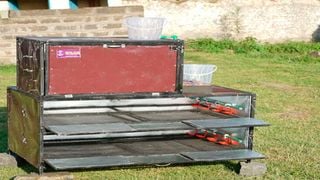
The Incubrooder, which regulates temperature, humidity levels and periodically turns the eggs.
| Joseph OPenda | Nation Media GroupEnterprise
Premium
How failed venture inspired engineers Samuel Mwangi, Peter Mwangi to develop a hatching machine
A shocking loss of an entire business investment turned out to be a blessing in disguise for two friends who were determined to venture into agribusiness.
About three years ago, Samuel Mwangi and Peter Mwangi, both mechanical engineers, watched helplessly as their investment, a poultry farming venture, went down the drain when all the 60 chicks died at a go due to unfavourable climatic conditions.
Partly to blame for the failed startup was their ignorance regarding how the business was run. This loss is what motivated them to re-engineer an idea that would turn their fortunes around. The two put their heads together and made a machine that is able to automate the conditions necessary for chicks to hatch and brood to maturity with a very high survival rate.
The machine, which they named ‘Incubrooder’ is a combination of an incubator and a brooder that is able to automatically create artificial conditions necessary for hatching and brooding.
Since the invention, the engineers’ fortunes have been growing by day. From creating employment for themselves and others, the two are putting smiles on the faces of farmers who have been able to reduce their losses and increase their profits.
Plotus Technology
Samuel and Peter are now the co-founders of Plotus Technology, which manufactures their parent product, the Incubrooder.
Samuel, who is the company’s Chief Executive officer, says that his journey here began in his fifth year at Moi University. Having been brought up and raised in the rural areas of Njoro sub-county, he had planned to go into poultry farming once he graduated from university.
Determined to actualise his plan, Samuel bought 60 chicks from the Kenya Agricultural Research Institute (KARI), starting off his business.
After they died, he invited his childhood friend, Peter, to join him and find a solution to the problem.

Mechanical engineers Samuel Mwangi (left) and Peter Mwangi.
Peter had just graduated from the Technical University of Kenya and was yet to get a job, he readily agreed to team up with his friend.
“Together, we came up with the idea of developing the Incubrooder. We joined the CoELIB Centre, an incubation facility at Egerton University where we were mentored and assisted to develop the project for a year,” says Samuel.
Peter, who is the company’s Chief Technical Officer, explains that the work involved developing the software, designing the motherboard, as well as other features for the machine. In 2020, the two unveiled their first machine, which they sold to a farmer for Sh10,000.
The farmer was pleased with his investment, describing the machine as efficient, he was so happy, he referred more farmers to them.
“We sold the second unit for Sh30,000 and got more orders,” says Peter.
The incubator has software controls that enable hatching of different types of eggs, including chicken, turkey, duck and geese. The controls are able to regulate temperatures, humidity levels as well as periodically turn the eggs.
As for the brooder, it has an automatic waste disposal mechanism, temperature control, as well as amber red lights that ensures the comfort of the chicks while reducing stress and cannibalism.
“It also has automatic water drinkers which ensure that there’s availability of water throughout, it also reduces risk of contamination,” adds Peter.
Egg capacities
The machines have different chick and egg capacities, ranging from 98 to 700. Peter says the incubator has about a 99 percent hatching rate while the brooder promises a survival rate of 90 percent.
“The machine is user friendly such that anyone who can operate a mobile phone is able to operate it, we, however, train farmers how to use it,” adds Peter, who says that compared to the imported incubators, locally made ones serve farmers better because they are tailored to meet the needs of local farmers.
The company is located at the Njoro Vocational Training Institute, and has partnered with the institution to offer practical training skills, incubate ideas as well as mentor the students.
A unit goes for between Sh45,000 and Sh120,000 depending on its size and capacity.
Growing by the day, the firm has 10 employees.
A challenge they continue to grapple with is the high cost of raw materials, the price of steel, for instance, their main raw material, keeps rising.
Their innovation has not gone unnoticed, in October this year, the Incubrooder named the best innovation under the sustainable agriculture category by the Kenya National Innovation Agency in conjunction with National Environment Trust Fund.





